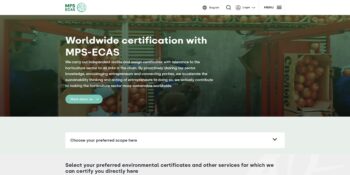Remote auditing: it is the way to continue conducting audits during the corona crisis. This allowed companies to remain certified and meet market demand. But will it also change the way of working in the future? Robert Stock is a freelance auditor at MPS-ECAS for, amongst others, the certification standards MPS-ABC, MPS-GAP, MPS-SQ, GRASP and Florimark TraceCert in various countries. He has been conducting remote audits for over a year now. “It is an acceptable solution to a big problem and opens up new possibilities.”
A remote audit is performed off site, without the content deviating from a traditional on-site audit. In many cases it turns out to be an acceptable alternative. Stock explains: “I haven’t encountered any major drawbacks with remote auditing for standards like MPS-ABC and Florimark TraceCert, because these audits focus on document checking, which I don’t necessarily have to do on site. Of course you sometimes have setbacks, such as a malfunctioning internet connection. This is especially difficult when I do a digital round about the company.”
Pros and cons
Travelling between countries is often still a challenge, which is why Stock conducts all audits remotely. “Of course, remote auditing has pros and cons. I found that it is often easier for me to check legal issues from home than on location, because I always have a good internet connection at home and I am able to check specific information on the official websites of the authorities of the country,” explains Stock. “And another advantage: the customer is now looking for some documentation, so I have time to answer your questions in between.”
Before Stock started remote auditing, he was travelling more than half of the time. He missed many important things, such as various events of his children in school and in private, weddings and birthdays. “Performing audits from behind my computer allows me to spend more time with my three-year-old daughter, 11-year-old son and my wife,” Stock says. “But I also miss auditing on location and especially the personal contact with the customers.”
Future opportunities
Some things were impossible to do digitally a year ago, while it has become normal now. According to Stock, remote and location audits can complement each other well. “For example, by going through all documents in advance for MPS-ABC, more time can be spent during the on-site audit observing the customer’s interpretation of the standards in the light of sustainability efforts. This can be done by talking to employees and checking how they implement theoretic requirements in reality.”
For some certification standards it is difficult to perform them remotely. For example, for MPS-SQ and GRASP, Stock conducts interviews with employees. This is much more difficult via a video screen. “Especially in Africa, this turns out to be quite complicated, because of the language and cultural barrier. That is already difficult on location, let alone how difficult it is digitally,” Stock says. “In addition, I have little chance of building a relationship with the interviewee via video calling. That comes at the expense of the quality of the answers.”
And what do customers think of remote auditing? “In the beginning, customers were skeptical and found it difficult that more and more things were going digital. But most customers are now comfortable with the situation. A year ago, some were still complaining about submitting documents digitally, while they are now asking me days in advance where they can submit everything,” Stock says. “Ultimately, when I ask them what their preference is, almost all customers say they hope I’ll perform the next on-site audit. I think this is because producers are often proud of their efforts and they feel it is more valuable to be audited in real life.”


